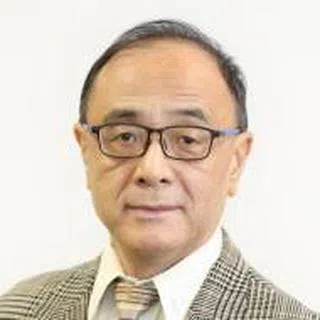China's elderly rulers must get used to the young criticising them
East Asian Institute senior research fellow Lance Gore observes that the recent protests in China have highlighted the deep generational gap between the leaders of the country and the protesters. In tandem with the modernisation of society, there needs to be the modernisation of politics, allowing greater room for political participation and dialogue.
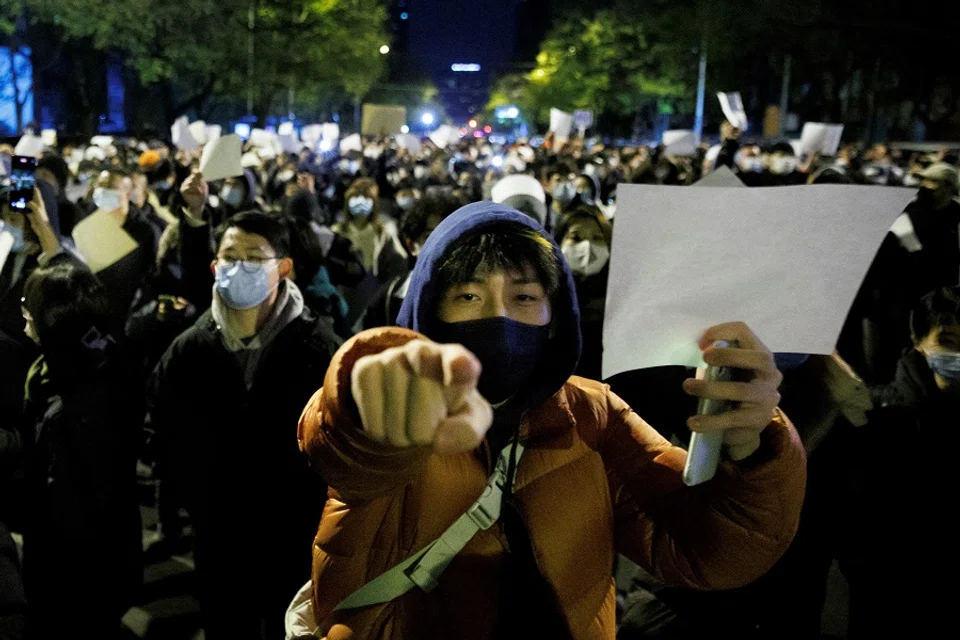
The seemingly sudden eruption of mass protests in China, which some have dubbed the "white paper revolution" or the "A4 movement", bears the imprint of the times. As expected, media both inside and outside China fell back on their usual discourse, with the latter focusing on the "democracy versus autocracy", "freedom versus authoritarianism" and "good versus evil" narratives.
Meanwhile, although the government has yet to release an official pronouncement, the opinions habitually siding with the government have labelled the protests a "colour revolution" manipulated by "foreign hostile forces". But such rhetoric can only lead us to a dead end - what we need is an objective analysis of cause and effect.
The mainstream international media conveys the impression that a prairie fire has sprung up and the Chinese Communist Party (CCP) is unpopular. However, the protests in China are nothing compared to the violent protests that Western countries have seen over the past three years.
The stark contrast between China closing itself off and the world opening up stems from China's excessive anti-Covid measures and the fact that other countries have chosen to "lie flat" and succumb to the pandemic, which they have paid a huge price for. For example, the total number of Covid deaths to date is just over 5,200 in China, but over 1.1 million in the US.
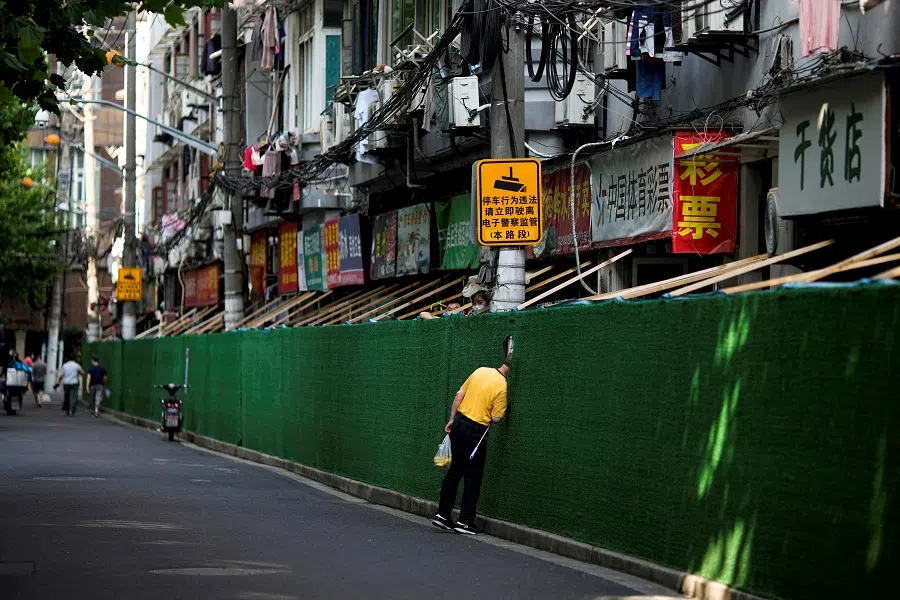
China's problem is its overconfidence in the system. Being trapped by its slogan of putting the lives of its people above all else, it implemented a single-minded Covid policy at the expense of other considerations. Despite the World Health Organization's warnings that China's zero-Covid policy is unsustainable, the CCP's 20th Party Congress report affirmed the adherence to the dynamic zero-Covid policy.
Under pressure from above, local governments increasingly tightened Covid restrictions. Worried that new Covid-19 cases would be reported in their jurisdictions, officials categorically imposed lockdowns, ultimately triggering the mass protests.
Protests on this scale have rarely been seen after 1989, and are also the authorities' biggest fear.
Echoes of 1989
It is rather embarrassing and puzzling to see such large-scale demonstrations erupting in a country where the government constantly cites its 90% plus support ratings. After enduring three years of constant Covid restrictions, the people have much pent-up frustration and anger in them that transcend class and geographic boundaries.
Amid week-long and even month-long lockdowns, migrant workers struggled with food shortages and unemployment; university students were trapped in their dormitories; urban workers were unable to commute to work; small and medium-sized enterprises, as well as small stores collapsed; and critically ill patients did not receive timely treatment due to lockdown restrictions - all of their anger and frustrations are directed at the same source. Protests on this scale have rarely been seen after 1989, and are also the authorities' biggest fear.
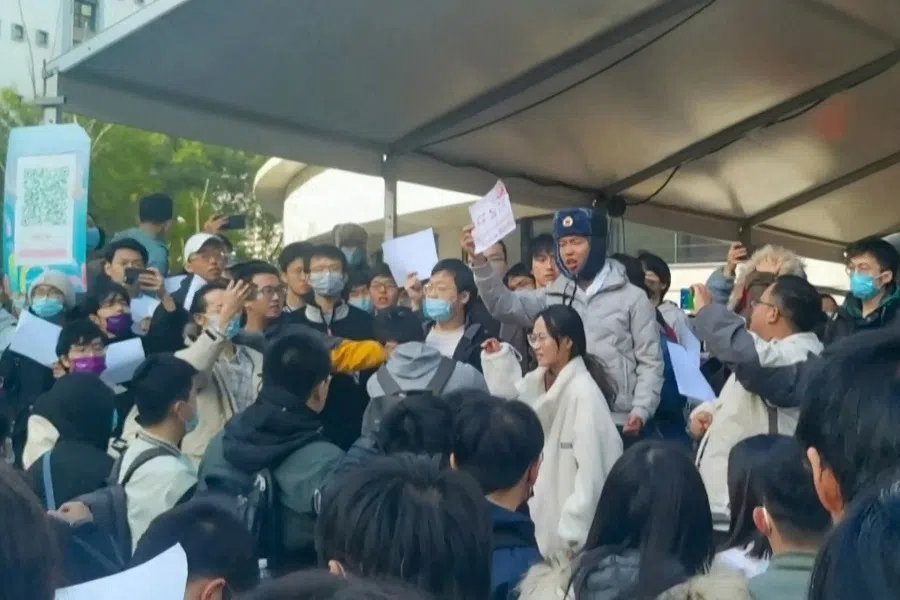
The CCP's single-minded Covid policy focused on a few thousand Covid deaths but neglected tens of thousands of collateral casualties, the education of hundreds of millions of students, the livelihoods of 1.4 billion people, and the entire Chinese economy.
Such decisions reflect neither collective wisdom nor scientific reasoning, let alone any form of participation by the people whose lives are impacted. Instead, they reek of autocratic decision-making on behalf of the people. For example, top American infectious disease expert Dr Anthony Fauci has said that he does not understand why China locked up its people for three years without taking the time to maximise the rate of vaccination.
Is it lockdowns for the sake of it or a blind faith in the system to work wonders? Following the protests, restrictions have been abruptly eased, but the haphazard lifting of Covid restrictions could result in a tsunami of Covid deaths, creating a new crisis. All these point to the capriciousness of the Covid policy.
...the recent protests are even more significant than the one in 1989 - there are no more illusions about Western liberal democracy, just an aspiration for shared humanity.
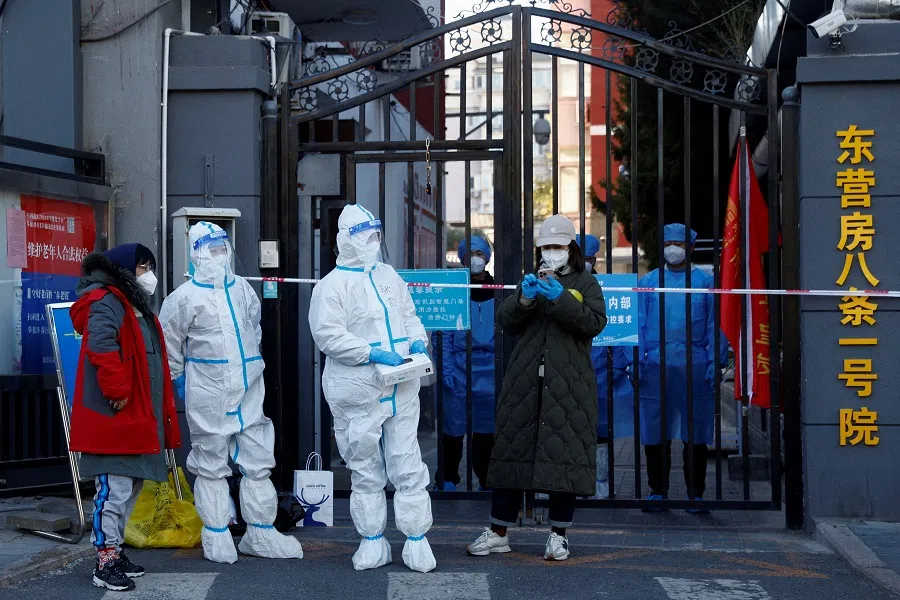
Far more noteworthy are the youths who dared to voice their opinions in front of the camera, raising demands that go far beyond their personal circumstances. A protester led the crowd to repeat the slogan on a banner hung over Beijing's Sitong Bridge: "No to PCR tests and yes to food; no to blockade and yes to freedom; no to lies and yes to dignity; no to Cultural Revolution and yes to reform; no to dictatorship and yes to votes; no to slavery and yes to citizenship."
The protester's chant almost echoed the one from 1989: human rights, freedom, democracy, rule of law, anti-dictatorship and anti-oppression. The Tiananmen movement occurred during the ascendance of neoliberalism in the West and on the eve of the collapse of communism. The present situation is almost the reverse - in Xi Jinping's words, it's "the East rising and the West falling". In this context, the recent protests are even more significant than the one in 1989 - there are no more illusions about Western liberal democracy, just an aspiration for shared humanity.
People from different eras
The A4 movement is a clash of two eras in the Chinese epoch. The current generation of top Chinese leaders grew up in the 1950s and Cultural Revolution; the circumstances of their youth and those surrounding the generations who grew up in the reform and opening up era cannot be spoken of in the same breath. There is no comparison between their different world views, values, knowledge base, life experiences, family background, education, material circumstances, and career paths. It is the latter group that is more representative of the trends and values of today, as evidenced by the wide support from Chinese students overseas for the A4 movement.
The past leading the present, that is the problem of the generational gap in Chinese politics.
Modern society is dynamic, based on knowledge renewal rather than accumulation of experience, and on innovation rather than tradition. However, China's political system is designed for the elderly - the ruling elites rise as a cohort one step at a time. By the time they reach the top, they are generally in their sixties or even seventies, at least two generations apart from the youngest adults in the population.
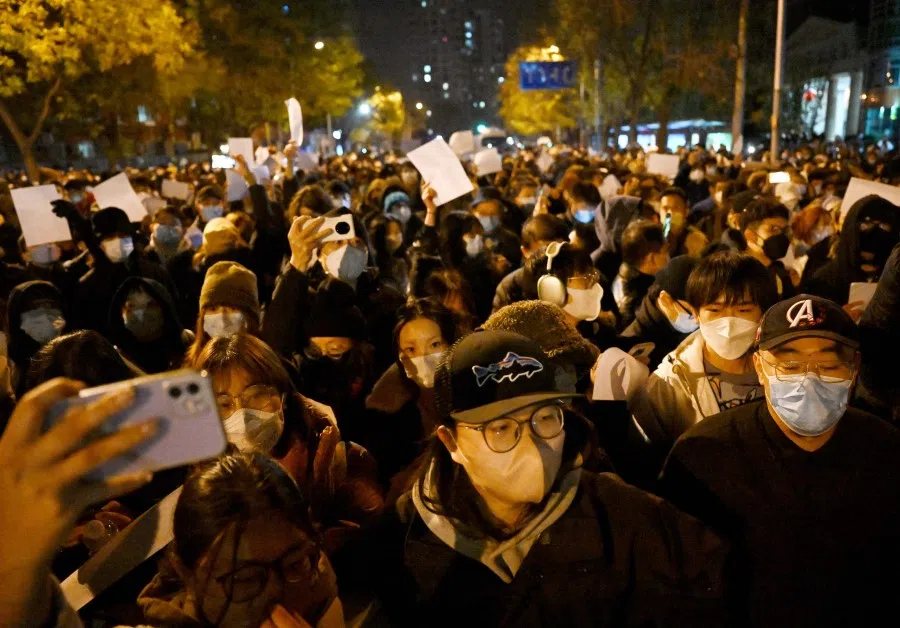
With each step up, they gain greater power and freedom to practise their ideals formed in the previous era, unconsciously bringing back an idealised past. The past leading the present, that is the problem of the generational gap in Chinese politics.
For example, in the "red" or Communist education that the older generation went through, personal obedience to the party, being a "screw that never rusts", ready to "pack up and go" at the beck and call of the party - such ideas and actions naturally became the "Four Awarenesses", "Two Upholds", "Two Establishes" that demand "absolute loyalty". The younger generation would find it hard to understand, but the older generation in office revel in it.
For someone who has gone through extreme poverty and slept in lice-infested cave dwellings, the difficulties encountered by today's youth seem trivial. It is difficult for those who grew up in the bloody storms of "class struggle" and "proletarian dictatorship" to appreciate such values as freedom, democracy, human rights, and the rule of law, but these are at the core of the lives and self-identity of the young generation. It was these rights that were wantonly trampled upon during the lockdowns.
...as long as such practices exist, it will be difficult for China to have soft power, and no matter how successful the China model is, it is hardly attractive to others.
People today are put off by the government telling them what to say and what not, by pervasive surveillance and brainwashing, and by informants and flatterers nurtured in the system. These are not only unacceptable for people in developed countries, but for most people in developing countries as well. This does not mean that the governments in the latter case are more enlightened; more often than not they are more corrupt and incompetent, but they do not have the CCP's ability for total control, and so their people do not go through what the Chinese people do under CCP rule, good and bad alike.
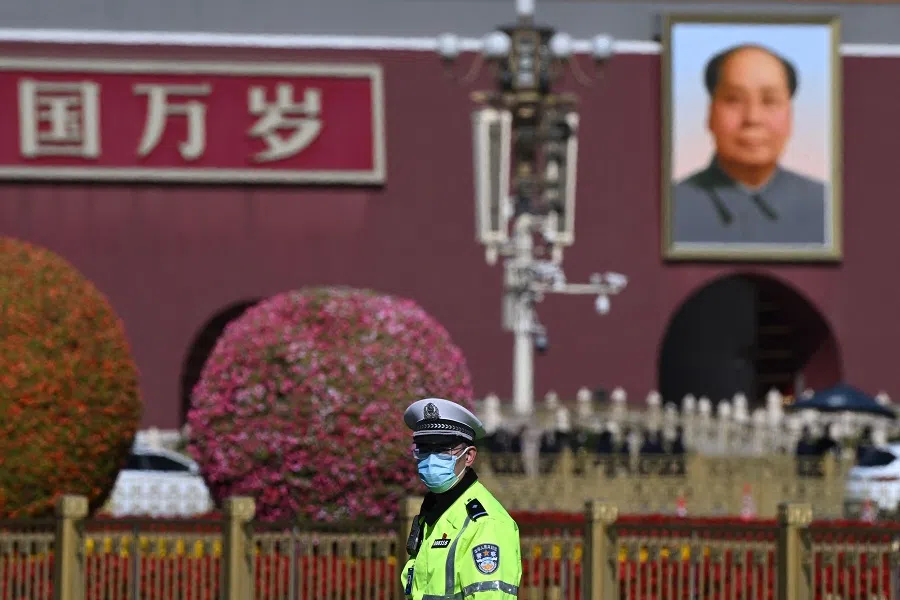
But the CCP has taken these for granted. And as long as such practices exist, it will be difficult for China to have soft power, and no matter how successful the China model is, it is hardly attractive to others.
The great leader's Tacitus Trap crisis
Today, when such large-scale protests break out, leaders generally address the nation, or announce adjustments to policies, or explain the reasons for sticking to the decisions made. However, the "great leader model" does not allow for this, because a "great leader" is never wrong; admitting to his mistakes would not only erode his prestige and authority, but also incapacitate this model of governance. The only thing to do is to stick with the mistake.
The Roman historian Tacitus argued that an unpopular government is hated regardless of what it does and whether its actions are right or wrong - that is the Tacitus Trap. The argument is even more valid in modern politics: not only do people not believe in a divine monarch, but it is also common for politicians to be reprimanded by the people.
It is widely acknowledged that a modern government cannot do without criticism from its people, yet it is almost completely absent in the CCP's governance.
In China today, the great leader model often reminds the Chinese of the darkest times and the most miserable periods in PRC history. Under such circumstances, should any leader still harbour the monarch complex and want a taste of what it feels like to be worshipped, he is not only behind the times but has also fallen into the Tacitus Trap.
The need for political modernisation
The essence of political modernisation lies not in having elections, but in rationalism and secularisation. Rationalism entails that all decisions are made on the basis of science, the law, principles, institution, rules of procedure and recognised standards, that is, objectivity. Secularisation implies abandoning the great leader model in favour of equality before the law, institution, procedures, common sense and conscience. In short, incorporating more elements of democracy, rule of law, liberty and open-mindedness, tolerance and respect into values and actions.
It is widely acknowledged that a modern government cannot do without criticism from its people, yet it is almost completely absent in the CCP's governance. The recent large-scale protests have dealt a blow to the newborn autocracy. This is a blessing for China, but it is nowhere near enough - perhaps misfortune has just begun.
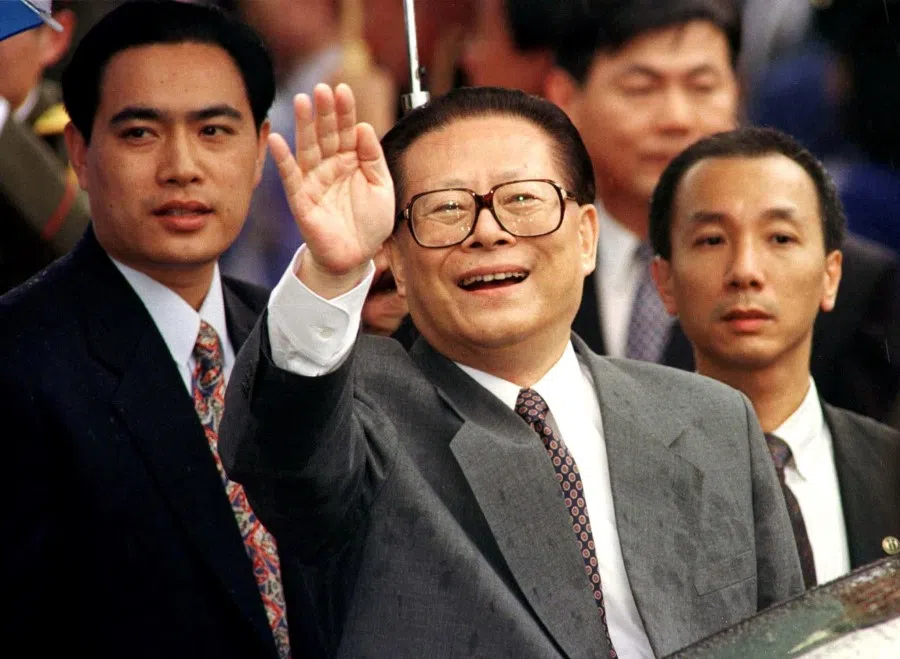
Upon his recent passing, Jiang Zemin unexpectedly received marks of respect and positive testimonies, as did Hu Yaobang when he passed on in 1989. This is because people remember the Jiang era as more liberal, free and progressive, with fewer ideological taboos. Under Jiang's leadership, the CCP established the socialist market economy as a goal of China's reform. Jiang's "Three Represents" significantly diluted the core Marxist-Leninist concepts such as class, class struggle, proletarian dictatorship, and exploitation, bringing capitalists into the ranks of the builders of socialism. Through pushing for China to join the World Trade Organization, Jiang also enabled China to be integrated into the global economy. All this laid the foundation for China's economy to take off and contrast starkly with today's political environment.
Among all the leaders of China to date, Jiang came closest to a modern politician. He did not try to appear dignified and mysterious, and wore his heart on his sleeve; he was always criticised but remained cheerful, was adept on the global stage, and steady under the incisive questioning of foreign reporters. And no wonder - Jiang completed his university education before 1949, and therefore had a broader world view. In comparison, the leaders since Hu Jintao grew up in a closed environment, with "red" ideology deep in their blood.
To tackle the generational gap, China needs to expand and strengthen political participation, and leaders must get used to the modern political norm of being scolded.
There is nothing to be praised about criticising political leaders on the slightest pretext and calling for their removal. It is generally detrimental, but this is what people are like today. The well-informed young people of today do not see their leaders as sacred figures, and may even really believe that leaders are meant to serve the people.
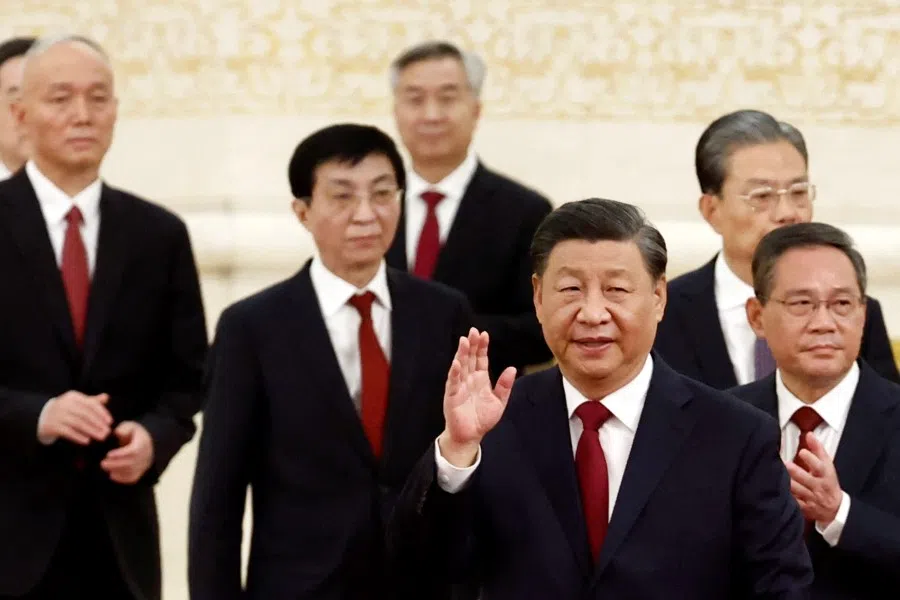
In contrast to the traditional idea that one has to be ready to be cut into pieces when offending the emperor, today's young have little sense of fear and respect, but it is also an inevitable outcome of modernisation. To tackle the generational gap, China needs to expand and strengthen political participation, and leaders must get used to the modern political norm of being scolded.
This article was first published in Lianhe Zaobao as "中国街头的时代冲突".
Related: Is China ill-prepared for a surge in Covid cases? | Covid protests: A repressed China needs an outlet to return to equilibrium | China is finally easing Covid rules, but not all are happy | This has to be the end of lockdowns in China | China's young and old have opposing views on zero-Covid
